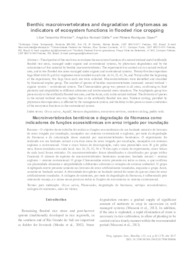Benthic macroinvertebrates and degradation of phytomass as indicators of ecosystem functions in flooded rice cropping.
Benthic macroinvertebrates and degradation of phytomass as indicators of ecosystem functions in flooded rice cropping.
Autoria: WINCKLER, L. T.; GUTHS, A. K.; GAYER, P. R.
Resumo: The objective of this work was to evaluate the ecosystem functions of a natural wetland and of artificially flooded rice areas, managed under organic and conventional systems, by phytomass degradation and by the colonization of this material by benthic macroinvertebrates. The experiment was carried out in a natural wetland area, and in two flooded rice areas managed under organic and conventional systems. Twenty-five decomposition bags filled with 10 g of dry vegetation were installed in each site. At 14, 28, 42, 56, and 70 days after the beginning of the experiment, five bags from each site were collected. Macroinvertebrates were identified and classified by functional trophic group. The number of species of benthic macroinvertebrates increased: natural wetland > organic system > conventional system. The Chironomidae group was present in all areas, confirming its food plasticity and adaptability to different substrates and environmental stress situations. The Amphipoda group was present only in the artificially flooded rice area, and the Acari, only in the natural wetland. The diversity of species in the natural wetland area was higher than in the artificially flooded rice area. Nutrient cycling, provided by phytomass decomposition, is affected by the management system, and the delay in this process causes a reduction of the ecosystem functions in the conventional system.
Ano de publicação: 2017
Tipo de publicação: Artigo de periódico
Unidade: Embrapa Clima Temperado
Observações
1 - Por padrão são exibidas publicações dos últimos 20 anos. Para encontrar publicações mais antigas, configure o filtro ano de publicação, colocando o ano a partir do qual você deseja encontrar publicações. O filtro está na coluna da esquerda na busca acima.
2 - Para ler algumas publicações da Embrapa (apenas as que estão em formato ePub), é necessário ter, no celular ou computador, um desses softwares gratuitos. Sistemas Android: Google Play Livros; IOS: iBooks; Windows e Linux: software Calibre.
Acesse outras publicações
Acesse a Base de Dados da Pesquisa Agropecuária (BDPA) para consultar o acervo completo das bibliotecas da Embrapa.

